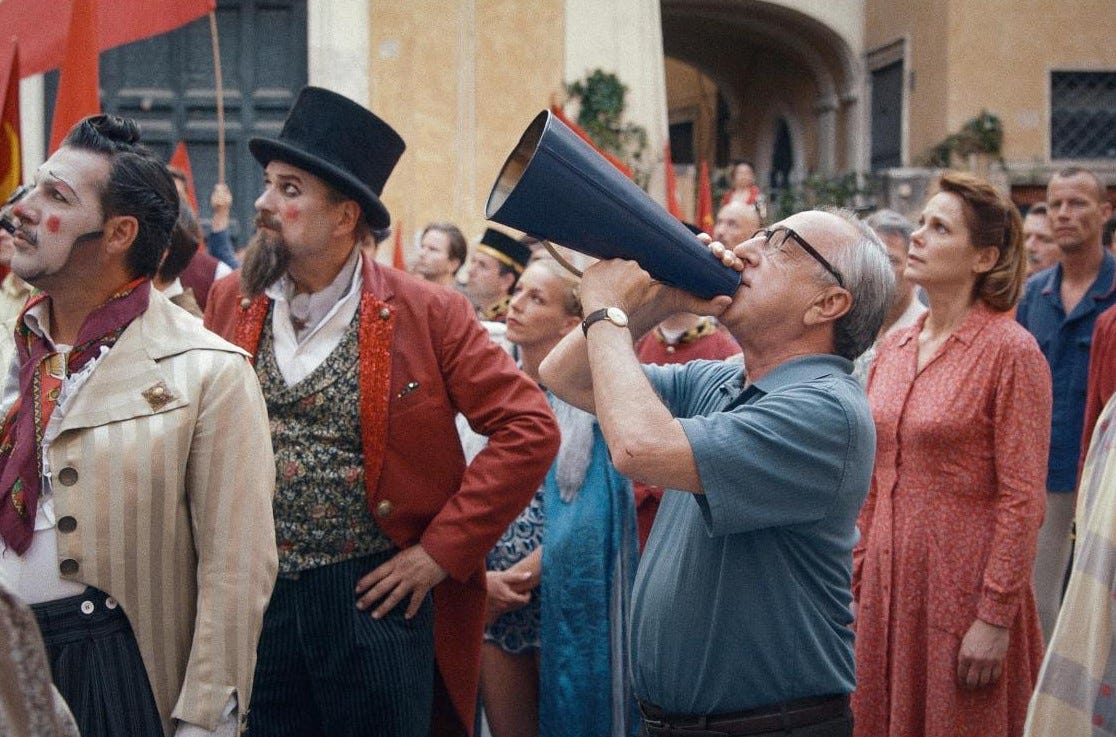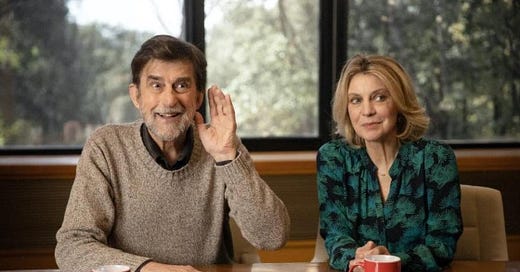Sentiment over politics
Nanni Moretti's latest is a work of a trickster. A depressed one, though
Nanni Moretti’s latest, A Brighter Tomorrow, which just opened at the Cineplex Varsity, is a complicated creature. Some of his films have been Moretti-completists-only and others break into the general anglo-mainstream (Habemus Papam, about a Pope who escapes from his job – this was before Pope Ratzinger quit – and Il caimano, which thinly fictionalizes Silvio Berlusconi, are just two of the handful). A Brighter Tomorrow is, like Mia madre, about directing films and sacrificing familial relationships in the process but also much much else. Film director Giovanni (Moretti plays a pompous and oblivious caricature of himself in many of his movies) is busy at work on a soc-realist film about the split in a Roman suburban community run by the Italian Communist Party over the Soviet invasion of Hungary in 1956. A travelling circus from Budapest is in the area, and a few days into their stay the artistes join the locals in the only apartment with a TV set in the neighbourhood to watch in horrified silence the footage of the invasion. A day later they go on strike “in solidarity with our people” but the local Unita editor Ennio (Silvio Orlando) and his close free-spirited comrade, seamstress Vera (Barbora Bobulova) have different views on the matter: he urges her to await the Party’s response before taking sides. There is no question in her mind that what the Soviet Union is doing is wrong, and that Italian Communists should condemn it.
It’s awkward, didactic dialogues all throughout and no wonder the main actress who plays the seamstress keeps riffing off them, which scandalizes the director. And why did she come wearing *mules* to the read-through when everyone knows he hates mules? Giovanni’s long-suffering wife Paola (Moretti’s long-time collaborator Margherita Buy) who has also produced every single one of his films is managing him as best she can, but she has been seeing a therapist in order to strengthen her resolve to leave him and move to the place she rented just for herself months ago. Their adult daughter also wants out of the gentle grip of Giovanni and his rituals and long monologues. (Gelato and calling on his dead mother in moments of stress are just some of the not so subtle hints of where Giovanni’s heading: that old mainstay of being old, the infantile regression.)
The story is based on an actual editor of the largest Communist daily in Italy, and Giovanni wants complete historical authenticity - except when he doesn’t. He removes the pictures of Stalin from the walls on the set although they absolutely hung on walls all throughout the PCI offices in the mid-1950s. Instead of choosing the historical mineral water brands, this uncompromising anti-consumerist creates one especially for the film and calls it Rosa, after Rosa Luxemburg. When a production assistant brings him a copy of the actual issue of l’Unita right after the invasion, which is unequivocally pro-Soviet Union, he realizes he can’t have that either.
Various little problems begin to eat at the production. Elephants that they ordered for the circus are being kept at the border, then redirected to another film crew. The female star keeps being insolent and in one tense scene of political disagreement she kisses comrade Ennio against the script. But this is a movie about political differences, they are not to have an affair, the director is adamant, to which she responds that no, it’s a love story, no one cares about their political differences. It’s the kind of sugary movie sentimentalizing which Giovanni generally abhors - he would rather be right than happy, he’s one of those people and artists. At the same time, Giovanni is mad about Italian pop songs and prepares for each shoot by singing aloud to his favourite hits. “I want to make a film about a couple of 40 years, just like Paola and I, and that film would be full of good Italian pop songs. That’s what I actually want to do,” he says in a low moment to his production director who’s driving him to the set. This is the song that he sings to, the car scene which segues into the scene with the entire crew singing it – this is Moretti’s film with Italian pop songs, the one that we’re watching.
In a later scene, which also intentionally interrupts the dramatic flow, they’re all twirling like dervishes to Franco Battiato’s “Voglio vederti danzare”:
Like a good number of Moretti’s films, this one is about why make films - or any art. While this may come across as a tad self-indulgent, the twilight of cinema in the age dominated by streaming platforms gives the film a darker tone. Against the new development in screen arts, there’s Giovanni’s self-important intransigence and purity, which Moretti as Giovanni gives his darnest to make serious and relatable. In an attempt to carve out a little bit of autonomy, Paola is producing a film for another director - a young guy making a Tarantino-level gore crime thriller where blood splatters and bits of bodies fly. Giovanni comes to keep her company on his day off, and can’t stop himself from intervening in the last scene of the shoot, in which a standing gun holder is about to blow the brains out of a kneeling victim. You can’t just shoot this scene like this, this is a terrible, worn out, cliched, dumb scene which pornifies violence, he insists, and we observe a near-total collapse of the fourth wall in the movie when Giovanni/Nanni phones various people in his phonebook to ask them if and when and under what conditions is it legitimate for art to depict graphic violence. One of them is the architect Renzo Piano, who opines on why Apocalypse Now is a work of art. Another one is a popular art historian Corrado Augias, who brings samples from the history of Italian painting to illustrate how “art is unexpected, never predictable”. Giovanni also leaves voicemail for Martin Scorsese to ask him how his depiction of violence changed from Taxi Driver to his latest films, all this a sort of homage too to that scene in Annie Hall when Woody pulls out Marshall McLuhan from the movie lineup and asks him to correct a loudmouth queue neighbour pontificating about his work.
After a long night and an extra day of argument and negotiation–the young filmmaker is bemused and patient with the elderly colleague, but Paola is at the end of her tether–the final scene gets finally shot (quite literally) and everyone goes to the wrap-up party sans Giovanni.
Whose problems mount. When the eccentric French financier (Mathieu Amalric) gets chased off the set by the financial police (Italian police forces have such a thing!), the rest of the filming is put in question. Some of the actors, unable to sit around and wait for the funds to materialize, move on. Meanwhile, Paola does leave him - a reality he can’t get used to, believing it’s a temporary glitch. “I need you,” he tells her, to which she responds, “No, you don’t need me. I am useful to you. There’s a difference.”
As he goes through his increasingly complicated life, there are parallel films in his head taking place, one of which is a young couple who go to the movies (the man droning on the ‘boring bourgeois lives and their trivial preoccupations’ just as the woman is about to tell him she liked the movie) and show up later to have a big fight that Giovanni scripts in real time. It’s likely that he is reviving and re-editing, possibly condensing in a few scenes, his own relationship with Paola through these anonymous characters. “We talk about everything; politics, films, work, anything really. Except our relationship,” Paola tells her shrink early in the movie. This is Giovanni realizing there’s value in talking about emotions.
Before running off the set, Pierre the French producer had arranged a meeting with the young Netflix executives for Giovanni and Paola, and having no other options left, he does meet them. “What is this character’s journey, what is the story arc?” is one of the first questions they ask, which gives Giovanni the chance to explain how people don’t change in real life nor do they learn much in the course of their story arc, if they get any to begin with. (From this point on of course you know this movie will have to introduce a growth and learning situation for Giovanni, and you rejoice.) Your film doesn’t detonate, it poofs, he is told, and what is with Italian actors, you don’t have a star system, that’s no good at all. And where is this film’s WTF moment? This being in Italian, as you can hear in the trailer, it was more whatdafuck.
After the insult session with Netflix, Paola saves the day by finding Korean producers who are attracted to the film’s pessimism - and to Giovanni’s international reputation. (Four young Koreans in business attire reading the script in Paola’s extra room and committing to fund the film there and then is probably the one irredeemably silly scene in the movie.) Ennio the protagonist, unable to solve the moral dilemma before him, is to take his own life, but undermined by self-doubt now, and after trying out the noose himself, Giovanni doesn’t want that scene any more. The final dialogue he’s written for the two non-lovers also strikes him as false. Secretary General Togliatti’s pro-Soviet stance in 1956 was one of the worst decisions made by the Italian Communist Party, and possibly the start of the end for the West European Communists and their ability to claim the moral high ground. Some of them stayed Stalinist until the very bitter end and turned a blind eye to the Czechoslovak invasion too. (France’s PC had a particularly long ‘story arc’ on that score.)

What if - what if he rewrote the film ending to make the pro-Hungarian faction of the Italian Communists the winning one? It is not how it happened, but we need feeling over ideology sometimes, sentiment over politics, personal relationships over history. So the final scene is rewritten to be triumphantly counter-historical, positive effects of the decision to condemn the Soviet invasion rippling into our own era. Rome looks glorious in the last scene in which everyone who appeared in the film marches together, inaccurately, but joyously, towards a brighter future. For this scene, Moretti invited actors from his earlier movies to join them.
It’s a phenomenally hard film to watch when you realize where the Italian left is at the moment - with the Italian premier civilizing and it appears successfully kicking the post-Mussolini once-fascist party, and with it the further reaches of the country's right, into the twenty-first century. There is something almost depressing about the film’s sunlit nostalgia, and its averting direct gaze from any present-day challenges before the left parties in Italy. It opens itself to the kind of criticism that the Italian Esquire culture critic jumped on: “A Brighter Tomorrow is a crib of Morettism, tied to an Italy (and a left) that doesn’t exist any longer”. Ouch - well, maybe. Or maybe this absenteeism, over-intellectualizing, infantile regression, self-mythologizing is exactly what the left has been occupying itself with. Perhaps the latest edition of Morettism is, past its historical rewrites, underneath all the gelato, truthful at its core.



